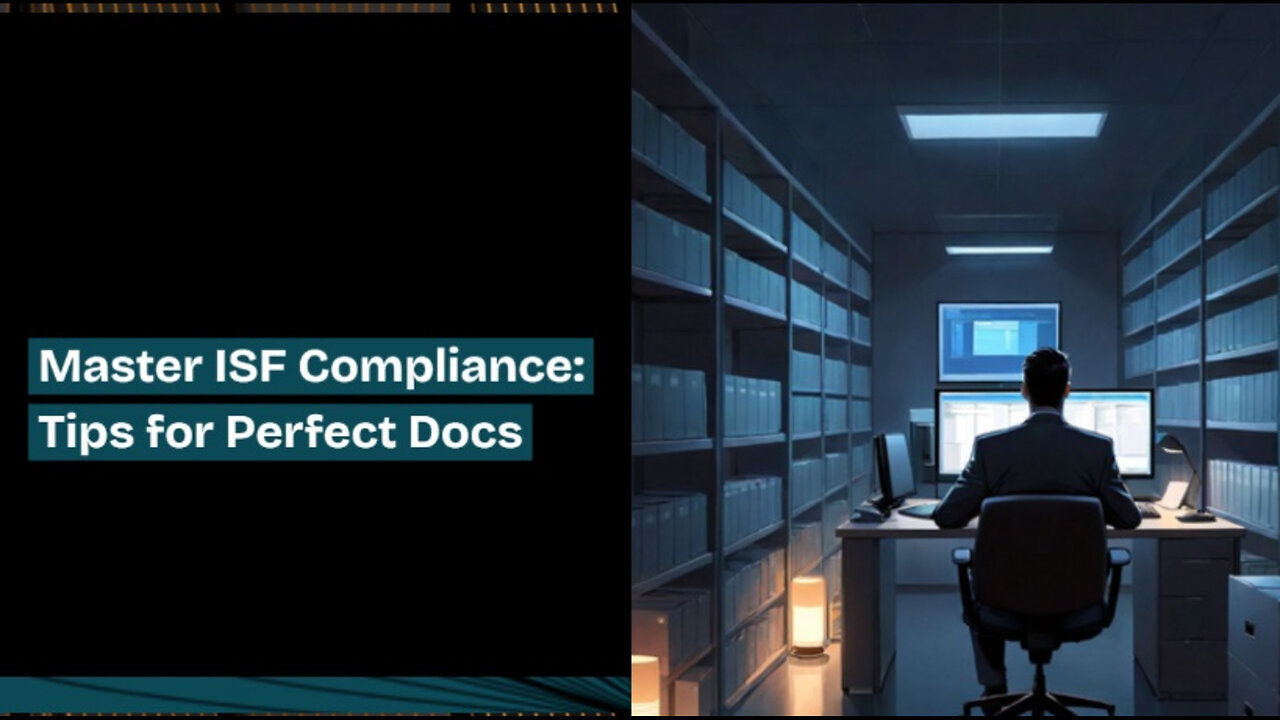Premium Only Content

Mastering ISF Compliance: 6 Best Practices for Importers and Customs Brokers
ISF Checklist || 805-970-7918 || contact@isfchecklist.com || www.isfchecklist.com
Today's video is focused on best practices for Importer Security Filing (ISF) compliance. ISF is a mandatory filing that must be submitted to US Customs and Border Protection (CBP) at least 24 hours prior to the vessel's departure. By following these best practices, customs brokers and importers can ensure the accuracy and proper management of their customs documents, improving ISF compliance and avoiding potential penalties or delays. The first best practice is to understand the ISF requirements, which include providing detailed information about the imported goods for risk assessment and cargo security checks. Maintaining open communication with suppliers is another important practice, as they play a crucial role in providing accurate and timely information for the ISF filing. It is also crucial to verify the accuracy and consistency of the data provided in the filing to avoid errors and discrepancies. Organizing and storing documents properly is essential for ISF compliance, as it allows for efficient retrieval when needed for audit or reference purposes. Staying updated with regulatory changes and implementing regular internal audits and reviews are also important practices to ensure ongoing ISF compliance. In conclusion, adhering to these best practices will improve the accuracy and management of ISF filings and contribute to smooth international trade operations.
#usimportbond #isfcustomsbroker #uscustomsclearing #isfentry
Video Disclaimer Here: This video is purely educational and has no ties with the US government.
0:10 As a customs broker or importer, it is crucial to ensure the accuracy and proper management of your customs documents.
0:30 One of the best practices for ISF compliance is to maintain open communication with your suppliers.
0:42 Another important aspect of ISF compliance is verifying the accuracy and consistency of the data provided in the filing.
0:50 It is essential to double-check all the information provided by your suppliers or stakeholders, such as the bill of lading number, product description, and container loading sequence.
-
 12:51
12:51
Chef Donny
3 hours agoTossing Coach Jon Gruden A Caesar Salad | What's For Lunch
17.5K1 -
 1:30:57
1:30:57
Mally_Mouse
3 hours agoLet's Yap About It - LIVE!
10K4 -
 1:36:33
1:36:33
Steve-O's Wild Ride! Podcast
6 days ago $0.48 earnedSteve-O’s Niece Reveals What Kind Of Uncle He Is - Wild Ride #249
15.2K6 -
 LIVE
LIVE
Viss
4 hours ago🔴LIVE - Vissrespect Delta Force Duo Dominance! Viss w/ Dr Disrespect
344 watching -
 1:58:06
1:58:06
The Charlie Kirk Show
4 hours agoCalifornia Blazing + Greenland Aftermath | Sen. Johnson, Peachy Keenan, Saad | 1.8.2025
154K103 -
 1:10:10
1:10:10
Matt Kim
19 hours agoWhy the H-1B Visa MAGA Fight is HEATED | Matt Kim #133
56.6K22 -
 19:50
19:50
Rep. Andy Biggs
4 hours agoThe What's the Biggs Idea? Podcast is Live with Rep. Tim Burchett
28.9K7 -
 2:04:30
2:04:30
The Dilley Show
5 hours ago $12.37 earnedCalifornia Fire, The Cost of DEI w/Author Brenden Dilley 01/08/2025
50.7K3 -
 1:02:37
1:02:37
Grant Stinchfield
4 hours ago $4.72 earnedNo Water, Cancelled Insurance, DEI Focus, and Fired Firefighters... The Liberal Inferno!
40.2K36 -
 3:54
3:54
SLS - Street League Skateboarding
4 hours agoMariah Duran’s Journey as a Women in Skateboarding | Kona Big Wave “Beyond The Ride” Part 1
50.4K3